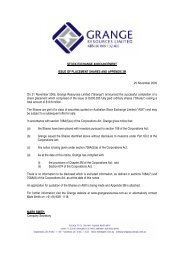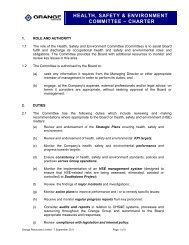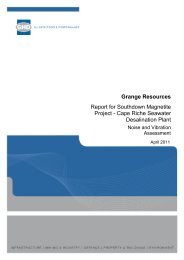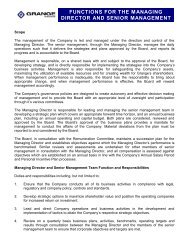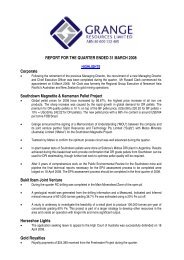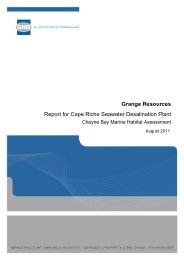2012 Annual Report (2 April 2013) - Grange Resources
2012 Annual Report (2 April 2013) - Grange Resources
2012 Annual Report (2 April 2013) - Grange Resources
You also want an ePaper? Increase the reach of your titles
YUMPU automatically turns print PDFs into web optimized ePapers that Google loves.
<strong>2012</strong> ANNUAL REPORT<br />
57<br />
PAGE<br />
(ac) Employee entitlements<br />
Wages and salaries, annual leave and sick leave<br />
Liabilities for wages and salaries, including non-monetary benefits,<br />
annual leave and accumulating sick leave expected to be settled<br />
within 12 months of the reporting date are recognised in other<br />
payables in respect of employees’ services up to the reporting<br />
date and are measured at the amounts expected to be paid when<br />
the liabilities are settled.<br />
Long service leave<br />
The liability for long service leave is recognised in the provision<br />
for employee benefits and measured as the present value of<br />
expected future payments to be made in respect of services<br />
provided by employees up to the reporting date using the<br />
projected unit credit method.<br />
Consideration is given to expected future wage and salary levels,<br />
experience of employee departures and periods of service.<br />
Expected future payments are discounted using market yields<br />
at the reporting date on national government bonds with terms<br />
to maturity and currency that match, as closely as possible, the<br />
estimated future cash outflows.<br />
Defined contribution superannuation funds<br />
Contributions to defined contribution funds are recognised as an<br />
expense in the income statement as they become payable.<br />
Share-based payment transactions<br />
Share based compensation benefits are provided to Directors and<br />
eligible employees under various plans. Information relating to the<br />
plans operated by the Company is set out in Note 40.<br />
The fair value of rights and options granted under the plans is<br />
recognised as an employee benefit expense with a corresponding<br />
increase in equity. The fair value is measured at the grant date<br />
and recognised over the period during which the Director or<br />
eligible employee become unconditionally entitled to the rights<br />
and options.<br />
The fair value of rights is determined with reference to the fair<br />
value of rights issued, which includes the volume weighted<br />
average price of the Company’s shares.<br />
The fair value of options at grant date is independently<br />
determined using either binomial option pricing or Black-Scholes<br />
pricing models that take into account the exercise price, the term<br />
of the option, the impact of dilution, the share price at the grant<br />
date, the expected volatility of the underlying share, the expected<br />
dividend yield and the risk free interest rate for the term of the<br />
option.<br />
The fair value of the options granted is adjusted, where necessary,<br />
to reflect market vesting conditions but excludes the impact of<br />
any non-market vesting conditions.<br />
Non-market vesting conditions are included in the assumptions<br />
about the number of rights and options that are expected to be<br />
exercisable. At each reporting date, the entity revises its estimate<br />
of the number of rights and options that are expected to vest or<br />
become exercisable. The employee benefit expense recognised<br />
each period takes into account the most recent estimate. The<br />
impact of the revision to original estimates, if any, is recognised in<br />
the income statement with a corresponding adjustment to equity.<br />
Where an equity-settled award is modified, as a minimum an<br />
expense is recognised as if the terms had not been modified. In<br />
addition, an expense is recognised for any increase in the value<br />
of the transaction as a result of the modifications, as measured at<br />
the date of modification.<br />
Where an equity-settled award is cancelled, it is treated as if<br />
it had vested on the date of cancellation, and any expense<br />
not yet recognised for the award is recognised immediately.<br />
However, if a new award is substituted for the cancelled award,<br />
and designated as a replacement award on the date that it is<br />
granted, the cancelled and new award are treated as if they were<br />
a modification of the original award, as described in the previous<br />
paragraph.<br />
The dilutive effect, if any, of outstanding options is reflected as<br />
additional share dilution in the computation of earnings per share.<br />
(ad) Contributed equity<br />
Ordinary share capital is recognised at the fair value of the<br />
consideration received by the Company.<br />
Any transaction costs arising on the issue of ordinary shares are<br />
recognised directly in equity as a reduction, net of tax, of the<br />
share proceeds received.<br />
(ae) Dividends<br />
Provision is made for the amount of any dividend declared,<br />
being appropriately authorised and no longer at the discretion<br />
of the entity, on or before the end of the financial period but not<br />
distributed at balance date.



